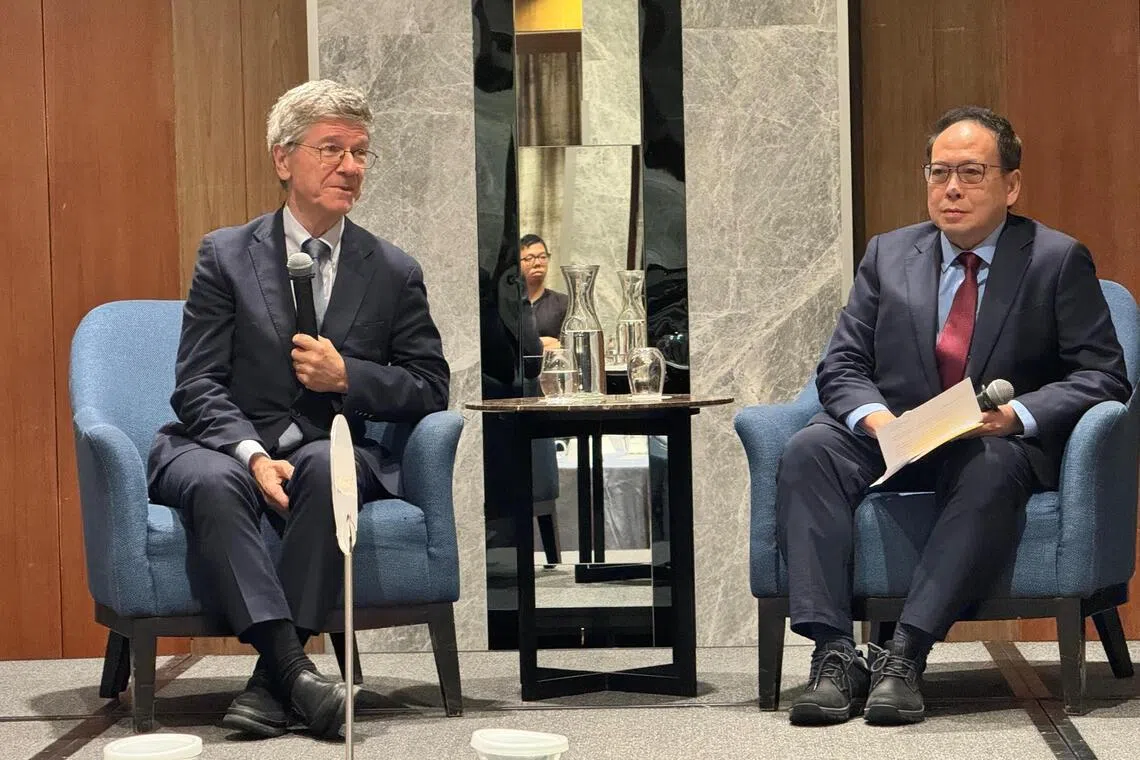US is ‘most destabilising force’ in global economic growth path: Economist Jeffrey Sachs
Sign up now: Get ST's newsletters delivered to your inbox

Economist Jeffrey Sachs (left) taking questions at the event, moderated by Economic Society of Singapore president Euston Quah.
PHOTO: ECONOMIC SOCIETY OF SINGAPORE
Follow topic:
- Economist Jeffrey Sachs believes the US is a "destabilising force" due to its pursuit of primacy, threatening multipolarity upheld by the US, Russia, China, and India.
- Sachs criticised Trump administration for "gangsterism" and the Biden administration for escalating tensions in Ukraine, contributing to global economic instability.
- Sachs highlighted climate change and the disruptive potential of AI as other challenges to global growth.
AI generated
SINGAPORE – Renowned economist and Columbia University professor Jeffrey Sachs said he believes the United States is the “most destabilising force in the world”, as he charted challenges to the global economy up to 2050.
Speaking at an Economic Society of Singapore (ESS) event on Oct 29, Professor Sachs named the administration of US President Donald Trump as a risk to maintaining a multipolar world, where power is shared among several major countries.
Multipolarism has powered growth since the end of European imperialism in the 1950s, driving industrialisation, the proliferation of technology, and an increase in literacy in markets including Asean, Prof Sachs said.
This environment allowed Singapore to develop as an “extraordinarily well-managed economy and well-managed society”, achieving a per capita income which surpasses that of America.
Prof Sachs considers the US, Russia, China and India as “great powers” holding up multipolarism in today’s landscape.
“They’re all economically dynamic. They are all technologically sophisticated. They are all nuclear powers. From a military point of view, not any of them can defeat the other in war, God forbid there should be one,” he said.
“This is a multipolarity that reflects a fundamental reality of world power, economy and technology, which is quite widespread. Talent is quite widespread in the world, and that, to my mind, is wonderful.”
But the US threatens to shift this peaceful balance as it considers itself a “superpower”,
“I believe the United States is the most destabilising force in the world today because it’s trying to maintain a primacy that it doesn’t have (or) can’t achieve, and the attempt to sustain it is dangerous and provocative,” Prof Sachs said while delivering the 6th ESS Distinguished Public Lecture titled “Asean and the World Economy to 2050”.
The professor pointed to aggravating factors such as the Biden administration’s decision to move troops closer to Ukraine after an invasion by Russia in 2022, and the increasing risks of a land invasion of Venezuela under Mr Trump’s leadership that will “add to the world scene of tremendous instability”.
Tensions between the US and Venezuela have escalated in recent months, after Mr Trump ordered strikes on a number of suspected drug vessels in the Caribbean as part of a campaign against what he calls a “narco-terrorist” threat linked to Venezuela’s President Nicolas Maduro.
Prof Sachs, who served as special adviser to UN Secretary-General Antonio Guterres and his predecessors Kofi Annan and Ban Ki-moon, had choice words for the US President and his administration.
“Trump, unfortunately, is not a stable character, and his government is pretty much a bit of gangsterism, unfortunately, in a lot of its dealings,” he said.
Mr Trump’s move to impose tariffs on virtually every country in the world since April has increased uncertainty for businesses and shaken financial markets.
However, his administration has since rolled back on export taxes and opened the door to negotiations with countries and major businesses, granting firms such as iPhone giant Apple and vaccine-maker Pfizer reprieves from planned sectoral tariffs.
Economists generally agree that global growth has so far held up. The International Monetary Fund expects growth to slow slightly from 3.3 per cent in 2024 to 3.2 per cent in 2025, according to its latest projections. It expects advanced economies to grow 1.6 per cent, and emerging economies to post a 4.2 per cent rate in 2025.
However, it projects that overall growth will slow to 3.1 per cent in 2026, with the risks of prolonged uncertainty, more protectionism and labour supply shocks.
Prof Sachs, who leads Columbia University’s Centre for Sustainable Development and the UN’s Sustainable Development Solutions Network, said the global economy also faces the challenge of climate change and an “interlocking range of environmental crises”.
In this regard, he believes Asean is in a competitive position to introduce an integrated power grid, which businesses can tap to reduce their carbon emissions.
This can be seen as an expansion of the landmark Laos-Thailand-Malaysia-Singapore power integration project – which delivered to the Republic its first imports of clean energy from Laos via Thailand and Malaysia in June 2022.
“It will be good for Asean to do it, but it will mean a major technological transformation,” Prof Sachs said. Connecting the 11-country grouping to China and Australia in the future would also form a very effective, resilient and low-cost energy system, he added.
The final major challenge to growth is technological advancement in fields such as artificial intelligence (AI), biotechnology and space technology, noted Prof Sachs.
Fundamental changes in technology are deeply disruptive and challenging to manage, he said.
In addition, technology is putting the world “at risk of the most unprecedented concentration of power ever seen in a small handful of individuals”.
“The difference between the utopian and the dystopian visions of AI is politics. Will there be general well-being? Depends on how we use our surplus,” he said.
“If all the surplus goes to the top, we will have massive poverty. If the surplus is widely shared through universal services, then we will have shared well-being.”


